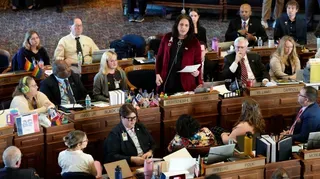March 9, 2011
AIDS Education, Prevention Gaining Toehold in Africa
Kilian Melloy READ TIME: 6 MIN.
For years, education efforts to combat the spread of AIDS in South Africa have seemingly battled against an unrelenting tide of new infections. But now the tide may be turning at last, a March 4 Reuters story reported.
The article noted that there are more than five and a half million people living with AIDS in South Africa, where the disease is prevalent among heterosexuals. One major source of infection, the article noted, comes from long-haul truckers who visit prostitutes, and then bring the virus back home to their wives--or else carry it with them to other prostitutes elsewhere on their routes.
But as education efforts continue, people in South Africa and other African nations are beginning to understand how HIV is communicated from person to person, and what they can do to combat the spread of the disease.
For years, South Africa's leaders mismanaged the AIDS crisis there, denying that HIV was the cause of AIDS, prescribing concoctions such as beetroot, garlic, olive oil, and lemon in place of anti-retrovirals made in the West for the treatment of AIDS patients, and failing to implement strategies that may have curbed the AIDS epidemic.
The current reality after such missteps is that South Africa has suffered more from the AIDS epidemic than any other country in the world. But a change in leadership two years ago brought about reforms to address the country's growing health crisis. Education efforts--sometimes carried out in spite of the government, but more recently enabled by the government--seem to be having an effect: The Reuters article noted that the incidence of HIV has declined 25% over the past decade. Condom distribution and public service messages are only part of a massive government effort to spread information and contain the epidemic.
Still, those efforts are up against deep-seated cultural barriers, including a reluctance to use condoms. Moreover, an increasingly homophobic climate in Africa has stymied efforts to stem the rising tide of HIV infection.
An April 12, 2010, article at the website for amfAR, the Foundation for AIDS Research's The MSM Initiative, reported on the escalating anti-gay fervor in some African nations. The site's name, MSM, refers to "Men who have sex with men," an acknowledgement that many males who may be at risk of infection via sexual contact with others of the same gender identify themselves as heterosexual and are married.
In American jargon, men who identify as heterosexual but who seek other men for sex are said to be on the "down low." But men on the down low often neglect to get tested for HIV, partly due to a stigma around HIV. The unfortunate result is that untested, HIV+ individuals can unknowingly expose others to the virus. Moreover, not getting tested means that HIV+ individuals do not get treated--and early treatment is key in preserving the health and the lives of people living with HIV.
But efforts to educate and reach out to the public about fact-based matters of sexual health can get activists in trouble. The MSM article reported on several instances of anti-gay mob violence and official persecution faced by those seeking to inform and educate the public, including clinic workers in Kenya who were attacked, beaten, and doused with kerosene; efforts to set the men alight were not successful.
In Malawi, the article noted, an activist was arrested for possession of health material related to sexuality and HIV because authorities viewed it as "pornographic." Other arrests reportedly targeted supporters of two Malawi gay men who were imprisoned after hosting a party to celebrate their engagement to be married; the wedding would have not have been legal, since in Malawi marriage equality is against the law, but the celebration alone resulted in "indecency" charges under laws that are used to persecute gays.
The article also cited a bill being considered in Uganda that would punish gays with the death penalty for repeated sexual encounters with other men--or a single encounter, if the suspect is HIV+. The article noted that the anti-gay law was proposed following a visit to the Uganda by anti-gay American evangelicals who lectured about the "gay agenda."
"Homophobia, of course, is present in every country," the MSM Initiative article reads. "But a wave of homophobic rhetoric and violence in some African countries is undermining efforts to combat high rates of HIV/AIDS among MSM. Human rights activists, AIDS advocates, and grassroots MSM organizations-including a number of groups funded by amfAR's MSM Initiative-say that the progress that had been made over the past several years in reaching African MSM is being threatened by a new climate of fear and repression that is sweeping parts of the continent."
Canada news agency CanWest reported in a Jan. 4, 2010, article on the situation faced by gays in Senegal, a predominantly Muslim nation where gays face social rejection and legal peril. As in other places, groups dedicated to fighting HIV by educating the public are seen as "promoting" homosexuality, the article said.
The article also noted that of the estimated 33 million people worldwide who are living with HIV, two-thirds are in sub-Saharan Africa. "These people, because they're harassed, will hide," said the executive director of the U.S. Global Fund to Fight AIDS, Tuberculosis and Malaria, Michel Kazatchkine. "Because they hide they will not access treatment services, and they will go underground and spread the epidemic. So stigma and discrimination are major issues."
A similar warning came from UNAIDS head Michel Sidib�, who noted that in 85 nations consensual sexual relations between adults of the same gender are against the law, and that the legal and social climate in those places helps to drive the soaring rate of HIV infections, which afflict gays and straights alike. "We must insist that the rights of the minorities are upheld," a Mar. 16, 2010 Associated Press article quoted Sidib� as saying. "If we don't do that... I think the epidemic will grow again. We cannot accept the tyranny of the majority."
But, said the MSM Initiative website, there has been one positive outcome in the rising tide of anti-gay violence sweeping some African nations: even in the most homophobic countries, the issues are now being openly discussed, something that did not happen before. "More people know about our initiative," said Kenyan activist Peter Njane, director of Ishtar MSM, which receives funding from amfAR. "After we were mentioned in the media, our website kept jamming," Njane said. "People who need information are coming to us."
Such outreach can only help.
"We're hoping that this 25 percent decline over the last 10 years will start to speed up," UNAIDS Deputy Director Paul de Lay told Reuters. "It's not happening fast enough. It's progress, but if it continues at this rate then we are talking another 40 to 50 years of this epidemic until it gets down to the lowest levels."
One particularly bright spot is Zimbabwe, a nation that borders on South Africa. Over a ten-year period, from 1997-2007, the incidence of HIV infection plummet by 50% in that nation, the Reuters article said. While education and outreach were part of the story there, some suggest that ingrained cultural attitudes were a major part of the country's success story.
"Zimbabwe is distinctive in having high levels of education and quite a strong marriage system," Imperial College London's Simon Gregson told Reuters. "It might be that messages that promote being faithful and sticking to one partner are more easily digested and translated into action in a country like Zimbabwe."
However, the article said, one lingering question is how to keep such education efforts ongoing so that younger people don't tune them out, inviting a resurgence of the disease. Such a resurgence seems to be happening in the Western world, where HIV rates are climbing once more among young people who were not yet here to see the ravages of the epidemic's first wave in the 1980s and early 1990s.
"What we are seeing," said de Lay, with reference to the resurgence of HIV among the youth in the West, "is a reduced sense of vulnerability, a reduced sense of how severe the disease is." But the answer isn't a simple as turning up the volume on education efforts, de Lay added. "We can't create a constant climate of fear, but at the same time people should have a healthy respect for how serious this is."
The Reuters article contrasted the successes in South Africa and Zimbabwe with Nigeria's response, where some people indicated that even though they had heard about how to protect themselves from infection, they were not always willing to employ safer sex methods like condom use.
"People are getting more aware," Mohammed Babaji, 42, told Reuters. "They see things on TV and when they go to the hospitals." But knowledge does not always translate to action.
"I know I am supposed to wear condoms to protect myself," said 25-year-old Abdul Abdulkarim, "but most young men here will not use them because they will not enjoy as much." Added the young man, "The men here have a lot of girlfriends and they use prostitutes. I don't think Nigerians really fear death."
Kilian Melloy serves as EDGE Media Network's Associate Arts Editor and Staff Contributor. His professional memberships include the National Lesbian & Gay Journalists Association, the Boston Online Film Critics Association, The Gay and Lesbian Entertainment Critics Association, and the Boston Theater Critics Association's Elliot Norton Awards Committee.




